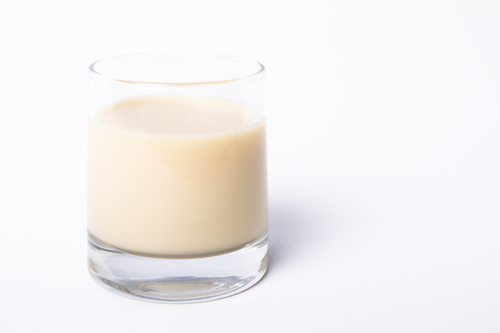New Study - Dairy and Breast Cancer Risk
Posted:
2020-02-27
Many news websites, including CTV (1), reported on a study (2) that looked at soy and dairy consumption  and breast cancer risk. The study, which is part of the Adventist Health Study-2 (3), followed 52,795 North American women (mean age 57.1 years; free of cancer at study onset) for 7.9 years (between 2002 to 2007) who had a high average soy consumption. Self-reported food frequency questionnaires and 24-hour recalls were used to assess dietary intakes at entry into the study.
and breast cancer risk. The study, which is part of the Adventist Health Study-2 (3), followed 52,795 North American women (mean age 57.1 years; free of cancer at study onset) for 7.9 years (between 2002 to 2007) who had a high average soy consumption. Self-reported food frequency questionnaires and 24-hour recalls were used to assess dietary intakes at entry into the study.
There were 1,057 new breast cancer cases found via North American cancer registries during the study time (2). Intakes of dairy calories and dairy milk were associated with a slightly greater risk of breast cancer independent of soy intake (hazard ratio (HR) 1.22; 95% confidence interval (CI), 1.05 to 1.40 and HR 1.50; 95%CI, 1.22 to1.84, respectively, comparing 90th to 10th percentiles of intakes), while there were no clear associations found between soy products and breast cancer. Fat level of milks and the consumption of cheese and yogurt showed no associations with cancer. A decreased risk of breast cancer was associated when substituting median intakes of soy milk for dairy milk (HR, 0.68; 95%CI, 0.55 to 0.85). The authors concluded that as milk intake increased, so did the risk of breast cancer, when adjusted for soy intake.
An important concern about this study is that the news headline stated “One cup of milk per day associated with up to 50 per cent increase in breast cancer risk: study” (1), which is misleading since it focused on the relative risks of a rare outcome. Looking at the absolute risks (which is a better way to report these results since the cancer was rare), the risk of cancer in this study was 2% (2 cases per 100 women) and 3% (3 cases per 100 women) among women who drank milk (HR=1.50). The absolute risk difference is 1%, so the headline stating 50% increase is reporting a statistic that suggests a big risk. Reporting the absolute risk difference (1%) gives more relevant information on the actual risk for an individual (4).
When analyzing this study there are a few limitations that should be considered. This is an observational study, so cause and effect cannot be established. Dietary intakes were self-reported and only measured once at baseline, so there is room for errors and omissions. The study did not adjust for social determinants of health or quantities of moderate or total physical activity, quantity of alcohol consumed or amounts smoked (the authors only controlled for vigorous activity, duration of alcohol use and smoking ever or never), so some or all of these variables could confound the results.
These results contrast with findings reported by the American Institute for Cancer Research (5) and an overview of systematic reviews (6), which found no consistent associations between dairy products or milk intake and the risk of postmenopausal breast cancer and actually observed a reduced risk of premenopausal breast cancer.
Bottom Line
The authors of the study comment that dairy milk does have positive nutritional qualities and suggest that more research is needed to understand whether there is a true link between dairy intake, or other closely-related unidentified factor(s), and breast cancer risk. Until further research is available, dietitians can continue to review healthy lifestyle behaviours with clients including eating a balanced and varied diet that includes lots of vegetables, fruit and whole grain foods; engaging in regular physical activity; and avoiding smoking. Refer to the PEN client handout: Cancer Prevention Eating Guidelines.
References
- Bogart N. One cup of milk per day associated with up to 50 percent increase in breast cancer risk: study. CTV News. February 25, 2020. [cited 2020 Feb 27]. Available from: https://www.ctvnews.ca/health/one-cup-of-milk-per-day-associated-with-up-to-50-per-cent-increase-in-breast-cancer-risk-study-1.4826979
- Fraser GE, Jaceldo-Sielg K, Orlich M, Mashak A, Sirirat R, Knutsen S. Dairy, soy, and risk of breast cancer: those confounded milks. Int J Epidemiol. 2020 Feb; pii: dyaa007. doi: 10.1093/ije/dyaa007. Available from: https://www.ncbi.nlm.nih.gov/pubmed/32095830
- Loma Linda University Health. Adventist Health Study-2. 2020. [cited 2020 Feb 27]. Available from: https://adventisthealthstudy.org/
- Noordzij M, van Diepen M, Caskey FC, Jager JK. Relative risk versus absolute risk: one cannot be interpreted without the other. Nephrol Dial Transplant. 2017 Apr;32(suppl 2): :ii13-ii18. doi: 10.1093/ndt/gfw465. Abstract available from: https://www.ncbi.nlm.nih.gov/pubmed/?term=28339913
- American Institute for Cancer Research. Key findings. Diet, nutrition, physical activity and breast cancer. Revised 2018. Available from: https://www.aicr.org/research/the-continuous-update-project/breast-cancer/
- Jeyaraman M, Abou-Setta, Grane L, Farshidfar F, Copstein L, et al. Dairy product consumption and development of cancer: an overview of reviews. BMJ Open. 2019 Jan;9(1):e023625. doi: 10.1136/bmjopen-2018-023625. Available from: https://www.ncbi.nlm.nih.gov/pubmed/30782711